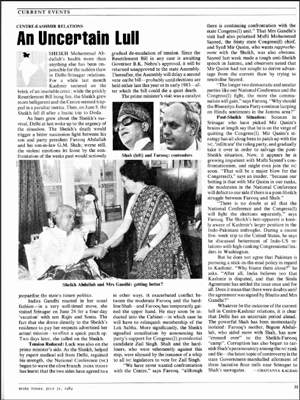AN UNCERTAIN LULL
[India Today]
Published date: 31st Jul 1982
SHEIKH Mohammad Abdullah’s health more than anything else has been responsible for the sudden thaw in Delhi-Srinagar relations For a while last month Kashmir teetered on the brink of an insoluble crisis while the prickly Resettlement Bill hung fire, the Sheikh grew more belligerent and the Centre seemed trapped in a peculiar inertia. Then, on June 8, the Sheikh fell ill after a hectic trip to Doda.
As fears grew about the Sheikh’s survival, Delhi at last woke up to the urgency of the situation. The Sheikh’s death would trigger a bitter succession fight between his son and party president Farooq Abdullah and his son-in-law G.M. Shah; worse still, the violent emotions let loose by the confrontation of the weeks past would seriously jeopardise the state’s future politics. Indira Gandhi reacted in her usual fashion-in a very well-timed move, she visited Srinagar on June 24 for a four-day ‘vacation’ with son Rajiv and Sonia. The fact that she drove directly to the Sheikh’s residence to pay her respects advertised her actual mission-to effect a quick patch up. Two days later, she called on the Sheikh.
Tension Reduced: Luck was also on the prime minister’s side. As the Sheikh, helped by expert medical aid from Delhi, regained his strength, the National Conference (NC) began to wave the olive branch. INDIA TODAY has learnt that the two sides have agreed to agradual deescalation of tension. Since the Resettlement Bill in any case is awaiting Governor B.K. Nehru’s approval, it will be returned unapproved to the state Assembly. Thereafter, the Assembly will delay a second vote on the bill-probably until elections are held either late this year or in early 1983-after which the bill could die a quiet death.
The prime minister’s visit was a catalyst in other ways. It exacerbated confict between the moderate Farooq and the hardline Shah-and Farooq has temporarily gained the upper hand. He may soon be inducted into the Cabinet-in which case he will have to relinquish membership of the Lok Sabha. More significantly, the Sheikh signalled conciliation by announcing his party’s support for Congress(1) presidential candidate Zail Singh. Shah and the hardliners, who were vehemently against this step, were silenced by the issuance of a whip to all NC legislators to vote for Zail Singh.
“We have never wanted confrontation with the Centre,” says Farooq, “although there is continuing confrontation with the state Congress(1) unit.” That Mrs Gandhi’s visit had also polarised Mufti Mohammed Sayeed, the feisty state Congress(1) chief, and Syed Mu Qasim, who wants rapprochement with the Sheikh, was also obvious. Sayeed last week made a tough anti-Sheikh speech in Jammu, and observers noted that Mir Qasim had not sought to derive advantage from the current thaw by trying to neutralise Sayeed.
“The longer two democratic and secular parties like our National Conference and the Congress(1) fight, the more the communalists will gain,” says Farooq. “Why should the Bharatiya Janata Party continue llarping on Hindu sentiments in the Jammu area?”
Post-Sheikh Situation: Sources in Srinagar who have picked Mir Qasim’s brains at length say that he is on the verge of quitting the Congress(1). Mir Qasim’s strategy has all along been to patch up with the NC, ‘infiltrate’ the ruling party, and gradually take it over in order to salvage the post- Sheikh situation. Now, it appears he is growing impatient with Mufti Sayeed’s confrontationism, and might even join the NC soon. “That will be a major blow for the Congress(I),” says an insider, “because our betting is that with Mir Qasim in our ranks, the moderates in the National Conference will defect to our side if there is a post-Sheikh struggle between Farooq and Shah.”
“There is no doubt at all that the National Conference and the Congress(1) will fight the elections separately,” says Farooq. The Sheikh’s heir-apparent 1s keenly aware of Kashmir’s larger position in the Indo-Pakistani imbroglio. During a recent five- week trip to the United States, he says he discussed betterment of Indo-US relations with high-ranking Congressional leaders in Washington.
But he does not agree that Pakistan is pursuing a stick-in-the-mud policy in regard to Kashmir. “Why blame them alone?” he asks. “After all, India believes too that Kashmir is disputed, and that the Simla Agreement has settled the issue once and for all. Does it mean that there were doubts until the agreement was signed by Bhutto and Mrs Gandhi?”
Whatever be the outcome of the current lull in Centre-Kashmir relations, it is clear that Delhi has an uncertain period ahead. The powerful Shah has been momentarily isolated : Farooq’s mother, Begum Abdullah, who sided more with Shah, has now “crossed over” to the Sheikh-Farooq “camp”. Corruption has also begun to tarnish Shah’sparamountcy among the Ircan k and file-the latest topic of controversy is the state Government-marshalled allotment of three lucrative flour mills near Srinagar to Shah’s surrogates.






